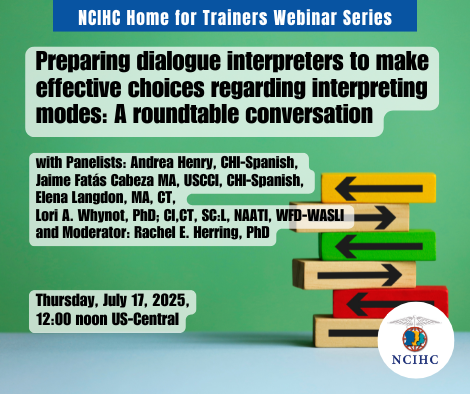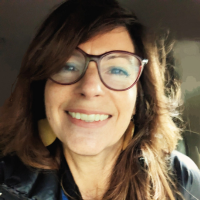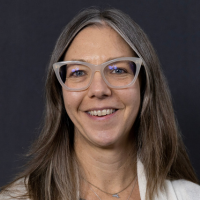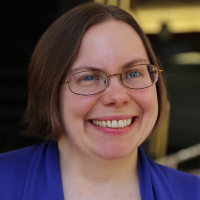|
Trainers Webinar #70

This 90-minute webinar took place on Thursday, July 17, 2025
at 1:00 PM US-Eastern / 12:00 noon US-Central / 11:00 AM US-Pacific.
This webinar will be recorded. The recording will only be available through the NCIHC Learning Center. Once the recording is available, individuals will need to submit a separate registration form to view the recording, including those who registered for the live broadcast. Recordings are free for NCIHC members and $30 for non-members.
NCIHC Members: FREE
Non-NCIHC Members: $30.00
(Become an NCIHC Member today!)

CEU Approvals:
CCHI - 1.5 hours
IMIA - 0.15 CEUs
RID - 0.15 CEUs
Preparing dialogue interpreters to make effective choices regarding interpreting modes: A roundtable conversation
with Panelists: Andrea Henry, CHI-Spanish, Jaime Fatás Cabeza MA, USCCI, CHI-Spanish, Elena Langdon, MA, CT, Lori A. Whynot, PhD; CI,CT, SC:L, NAATI, WFD-WASLI, and Moderator: Rachel E. Herring, PhD
Interpreters working in dialogue settings, including healthcare encounters, should be prepared to switch between consecutive and simultaneous interpreting as needed… but what does ‘as needed’ mean? How do interpreters decide which mode to use in what circumstances? In what kinds of situations is simultaneous interpreting a good choice? What about consecutive? How can we as trainers effectively prepare learners to make effective decisions regarding choice of interpreting mode?
During this webinar, panelists will discuss the topic of mode of interpretation, its impact on communication, and factors to be considered in choosing mode, all with a focus on teaching interpreters to navigate the complexities of this issue. Please note that this webinar does not focus on teaching consecutive or simultaneous interpreting. The conversation will take interpreter competence in both modes as a given, and focus on considerations of choice of mode.
Learning Objectives:
-
Explore how the use of mode in dialogue interpreting impacts communication among the participants
-
Discuss considerations that influence choice of mode (consecutive or simultaneous) in dialogue settings
-
Discuss approaches to teaching interpreting students how to effectively make decisions regarding choice of mode and changes in mode
About the Panelists:

Andrea Henry, CHI-Spanish
Andrea Henry has enjoyed working professionally in the field of healthcare interpreting for 29 years. She has worked as a freelance interpreter, full-time OPI interpreter, interpreter coordinator, interpreter trainer, full-time interpreter in a level 1 trauma center, and researcher. Andrea promotes specialization, outside-the-box methods for navigating technical speech and sociolinguistic bumps, as well as value-added scripting for improved encounter interaction. She is a lifelong learner and has taken several hundred hours of continuing education. Andrea is a member of the NCIHC and was a CCHI commissioner from 2021-2024. Finally, she is the principal investigator on grant-funded research on interpreter mental fatigue.

Elena Langdon, MA, CT
Elena Langdon is the Professional Development Manager for the Office of Language Access at Massachusetts Trial Court, responsible for recruiting, onboarding, and training court interpreters for the state. She has been a Portuguese-English interpreter and translator since 2001. She is certified by the American Translators Association (ATA) for Portuguese-into-English translation and holds an M.A. in Translation Studies from UMass Amherst. Elena has been teaching interpreting and translation since 2005 at various institutions. She has been on the board of directors of ATA, New England Translators Association, and National Board of Certification for Medical Interpreters.

Jaime Fatás Cabeza MA, USCCI, CHI-Spanish
Jaime Fatás Cabeza is an Associate Professor in the Spanish Department at the University of Arizona, a U.S. Court Certified Interpreter, and a seasoned healthcare interpreter with over 30 years of expertise. He spearheaded the healthcare and legal translation and interpretation program at UArizona, serving as its director for 16 years. Over the course of his career, Jaime has trained hundreds of interpreters, developed specialized legal and medical curricula for government agencies, higher education institutions, and healthcare organizations, and authored as well as translated a wealth of academic and professional texts spanning diverse subjects. Currently, Jaime contributes his expertise as a member of the editorial board of Access and serves on the Home for Trainers Webinars Work Group at NCIHC. Proudly an immigrant and an impassioned advocate for civil rights, Jaime’s work is a testament to his unwavering commitment to equity, diversity, and inclusion.

Lori A. Whynot, PhD; CI,CT, SC:L, NAATI, WFD-WASLI
Dr. Lori A. Whynot is a Professor of Interpreting and Director of the ASL & Interpreting Education Program at Northeastern University. M.A. Intercultural Relations; Lesley University; PhD in Linguistics from Macquarie University. She has published on interpreting mentorship, linguistic features of international signing (IS), and collaborative works on sign language translation and multilingual interpreting. She is a community, medical, legal, conference interpreter with three decades professional practice. Her working languages are English, ASL, Auslan, French, and International Signing strategies. Lori believes professional development can shape interpreting as social justice alongside deaf individuals through teaching, practice, and research.
About the Moderator:

Rachel E. Herring, PhD
Rachel E. Herring holds an M.A. in Translation and Interpreting (English/Spanish) from the Monterey Institute of International Studies, a Masters of Advanced Studies in Interpreter Training from the University of Geneva, and a PhD in Interpreting from the University of Geneva. She was Faculty and Program Director of the Translation and Interpreting Program at Century College and a per diem staff interpreter at Children's Minnesota until summer, 2025, when she transitioned into the role of Interim Dean of Liberal Arts at Century College. She has presented nationally and internationally on aspects of interpreting and interpreter training and is a longtime member of the NCIHC’s Home for Trainers Webinar Workgroup. Bluesky: @reherring
You may download our updated Webinar Policies HERE
Return to the Trainers Webinars Page
|








